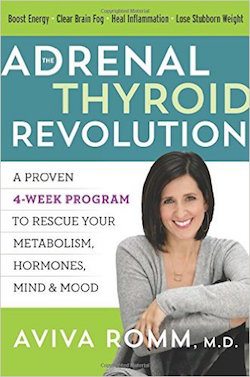It's 2 a.m. and you're staring at the clock trying to fall asleep. As if the insomnia weren't enough, your cycle's off and you're perpetually exhausted after spin class—and not in a hurts-so-good way, but in a my-whole-body-aches way.

Relatable? Well, these are just a few signs that you could have adrenal fatigue. Suddenly, it's something the wellness community can't stop talking about, right up there with inflammation in terms of buzz.
"Adrenal fatigue is when your body becomes overwhelmed with longterm stressors," says Aviva Romm, MD, an expert in all things hormonal. "I call it Survival Overdrive Syndrome—S.O.S."
It's something she sees all the time in her patients, and she recently released The Adrenal Thyroid Revolution to bring her good advice to the masses. Through years of research and listening to clients, she's created a four-week program designed to help women pinpoint which specific parts of their lifestyle could be causing adrenal fatigue—and then, how to deal. (No, you don't need to spend your savings on wellness retreats or become a yoga teacher to find balance.)
Here, she highlights the most insidious stress culprits and the most effective changes you can make to optimize your adrenal health. Spoiler alert: It involves more Netflix and sleep. Not such a terrible prescription, right?

{{post.sponsorText}}
Keep reading for four ways to fight adrenal fatigue naturally.

1. Limit your exposure to toxins—especially the sneaky ones
According to Dr. Romm, there are tons of things you encounter every day that affect your adrenals on the DL. "A lot of us tend to overlook how environmental factors can impact our hormones," she explains. "Your body is getting triggered by anything it sees as potentially harmful to you, even if you're not consciously aware of it."
Pollution is an obvious one, but even things like cleaning products, not-so-clean beauty products, pesticides, and detergents play a role.
"[Toxins] activate the anti-inflammatory pathways in your body, which can start to become a problem because your adrenals have to respond, and sometimes they get a little tired of responding all the time," Dr. Romm says.
That's why it's important to limit your exposure to substances that stress your system—because ultimately, it'll allow your adrenals to chill for a bit.

2. Fill up on detoxing foods (and do it often)
Just as you want to avoid harmful toxins, you also want to fill up on nutrients that help your body rid itself of any you do come in contact with.
"Often, the way we’re living is getting in the way of our body doing what it needs to do," Dr. Romm says. "We have to be 'taking out the garbage' every single day." (She means the garbage in your gut.) If you don't, you can expect all sorts of digestive drama. And anytime the body experiences stress, the adrenals get involved.
Dr. Romm's recommended fix? Fill up on leafy greens every chance you get. Their phytochemcials act as detoxifiers, and a healthy gut means happy adrenals.
But it's not just what you eat, but also when. "Our adrenal stress response system is rhythmic, and when we don’t pay attention to the cycles, cortisol gets disrupted," Dr. Romm says. She explains that when too much time passes between meals and blood-sugar levels drop, the brain interprets this as famine, which stresses out the adrenals.
To keep your glands from overreacting, Dr. Romm suggests filling up on nutrient-dense food every few hours. (Afternoon green smoothie run? Don't have to ask me twice....)

3. Prioritize sleep
The term "adrenal fatigue" gives this fix away—those glands need ample rest. That means seven to eight hours a night, according to Dr. Romm. "Sleep is when your body produces melatonin, which sets the circadian rhythm," she says.
She explains that when the body's sleep clock is out of whack, it puts stress on the adrenals, which can lead to brain fog and even more serious problems, like dementia.
If you have trouble falling or staying asleep, she says, filling up on foods with melatonin can help. So add bananas, pineapples, rice, and oats to your diet to jump-start your REM cycle. Or, talk to your doctor about taking a melatonin supplement.

4. Do something you love
You know what else is good for the adrenals? Having fun. That's because pleasure helps relieve emotional stress, a major cause of adrenal fatigue.
"It can be watching a silly movie, talking with a friend, a glass of wine and a bath, or reading a novel," Dr. Romm says. "When you focus just a little more attention on something that’s good, it starts to reprogram your brain to say, 'Oh, life is safe.' And then your emergency broadcasting system can stop telling your adrenals they need to activate, and everything can calm down."
So fire up the Netflix and curl up with a unicorn latte—doctor's orders.
If you're on the hunt for some more self-care ideas, these three are easy, yet powerful. Another major mood (and confidence) booster? Picking up a new hobby.
Loading More Posts...